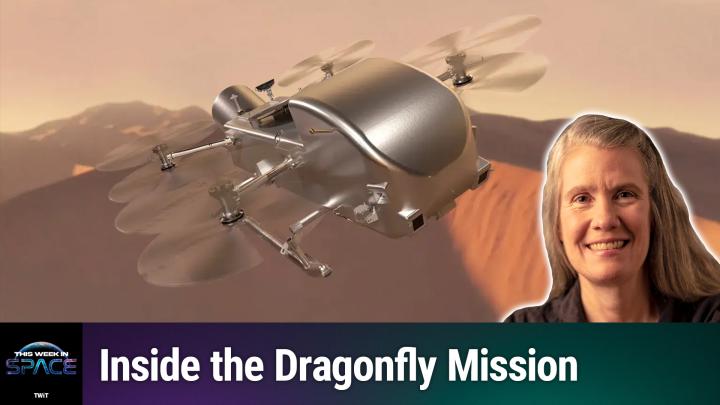Bigelow Space Module Flight Gets Government Okay
Breaking space news, the latest updates on rocket launches, skywatching events and more!
You are now subscribed
Your newsletter sign-up was successful
Want to add more newsletters?

Delivered daily
Daily Newsletter
Breaking space news, the latest updates on rocket launches, skywatching events and more!

Once a month
Watch This Space
Sign up to our monthly entertainment newsletter to keep up with all our coverage of the latest sci-fi and space movies, tv shows, games and books.

Once a week
Night Sky This Week
Discover this week's must-see night sky events, moon phases, and stunning astrophotos. Sign up for our skywatching newsletter and explore the universe with us!

Twice a month
Strange New Words
Space.com's Sci-Fi Reader's Club. Read a sci-fi short story every month and join a virtual community of fellow science fiction fans!
The U.S.Government has given payload approval to Bigelow Aerospace permitting theentrepreneurial firm to launch its inflatable space module technology.
Bigelow Aerospace of North LasVegas, Nevada has blueprinted a step-by-step program to explore the use of inflatableEarth orbiting modules. Those modules would not only support made-in-microgravityproduct development, but serve as the technology foundation for eventual space touristhousing and use of similar structures on the Moon and Mars.
The Federal AviationAdministration's (FAA) Associate Administrator for Commercial SpaceTransportation (AST) has given Bigelow Aerospace payload approval for flyingits Genesis inflatable module - one-third scale hardware crafted to lead to amuch larger space habitat dubbed the Nautilus.
Extensive review
The FAA-AST approval letterof November 17 regarding the Bigelow Aerospace scale demonstration module comesafter an extensive review of the concept, including its construction, materialsused, shielding technology, the in-space inflation process to be utilized, aswell as the deorbiting of the test module.
"Obtaining the FAA-AST payload approval forGenesis is a first of its kind," explained Mike Gold, corporate counsel forBigelow Aerospace in Washington, D.C. "This will go a long way toestablishing a good precedent for the inflatables," he told SPACE.com.
"This is a first step...butan important first step along the road that Bigelow Aerospace is traveling,"Gold added. To obtain the "favorable payload determination" by the FAA-AST, areview process took place over roughly an eight-month period, he said.
Breaking space news, the latest updates on rocket launches, skywatching events and more!
Gold said that the approvalletter is not "rocket specific" and carries no deadline date. The letterindicates, he said, that if a launch operator applies to the FAA for license tolaunch a vehicle carrying the Genesis payload, the favorable payloaddetermination will be incorporated in the review of the license application.
Nascent space firms
"It's one small step forthe FAA-AST, one giant leap for Bigelow Aerospace," Gold said. He saluted theFAA-AST for helping nascent space firms move forward and for taking a largerlook at the role entrepreneurs and new technologies can play in space.
Bigelow Aerospace is headedby Robert Bigelow, owner of the Budget Suites of America Hotel Chain, among aroster of other business ventures.
The current plan is tolaunch the Genesis payload on the private booster, the Falcon V, a derivativeof the still-to-fly Falcon 1 being built by Space Exploration TechnologiesCorporation (SpaceX) in El Segundo, California.
The Genesis prototypehardware would be onboard the Falcon V's maiden flight that is targeted for aNovember 2005 time frame.
Bigelow Aerospace alsoplans to loft a Genesis Pathfinder module in April 2006, using a silo-launched Dneprbooster under contract with ISC Kosmotras, a Russian and Ukrainianrocket-for-hire company.
America's Space Prize: international contestants not precluded
Earlier this month, BigelowAerospace took the wraps off the $50 million "America's Space Prize". That contest,with a January 10, 2010 deadline, is designed to stimulate the building of orbital,crew-carrying spacecraft that have the ability to dock with a Bigelow Aerospaceinflatable space habitat.
"We've gotten lots ofinterest from a variety of sources," Gold said. "It has run the spectrum fromsmall entrepreneurial groups to interest from larger traditional aerospacecompanies."
There have been some gripesfrom would-be contestants not based in the United States.
In the primary rules forthe competition it states that the contestant must be domiciled in the United States of America.Furthermore, the contestant must have its principal place of business in the U.S.
For one, if a spacecraftsystem is developed domestically in the United States, a benefit is notdealing with International Traffic in Arms Regulations (ITAR) and exportcontrol issues that can be "quite difficult and quite problematic," Goldexplained.
However, Gold added, thosetwo prize rules should not be construed as some kind of blanket prohibition oninternational participation. "I would imagine that an international entitywould be able to easily establish a subsidiary of some kind that would meetthose two requirements."
"America's Space Prize in no wayprecludes international participation. That's just not the case," Gold said.

Leonard David is an award-winning space journalist who has been reporting on space activities for more than 50 years. Currently writing as Space.com's Space Insider Columnist among his other projects, Leonard has authored numerous books on space exploration, Mars missions and more, with his latest being "Moon Rush: The New Space Race" published in 2019 by National Geographic. He also wrote "Mars: Our Future on the Red Planet" released in 2016 by National Geographic. Leonard has served as a correspondent for SpaceNews, Scientific American and Aerospace America for the AIAA. He has received many awards, including the first Ordway Award for Sustained Excellence in Spaceflight History in 2015 at the AAS Wernher von Braun Memorial Symposium. You can find out Leonard's latest project at his website and on Twitter.
